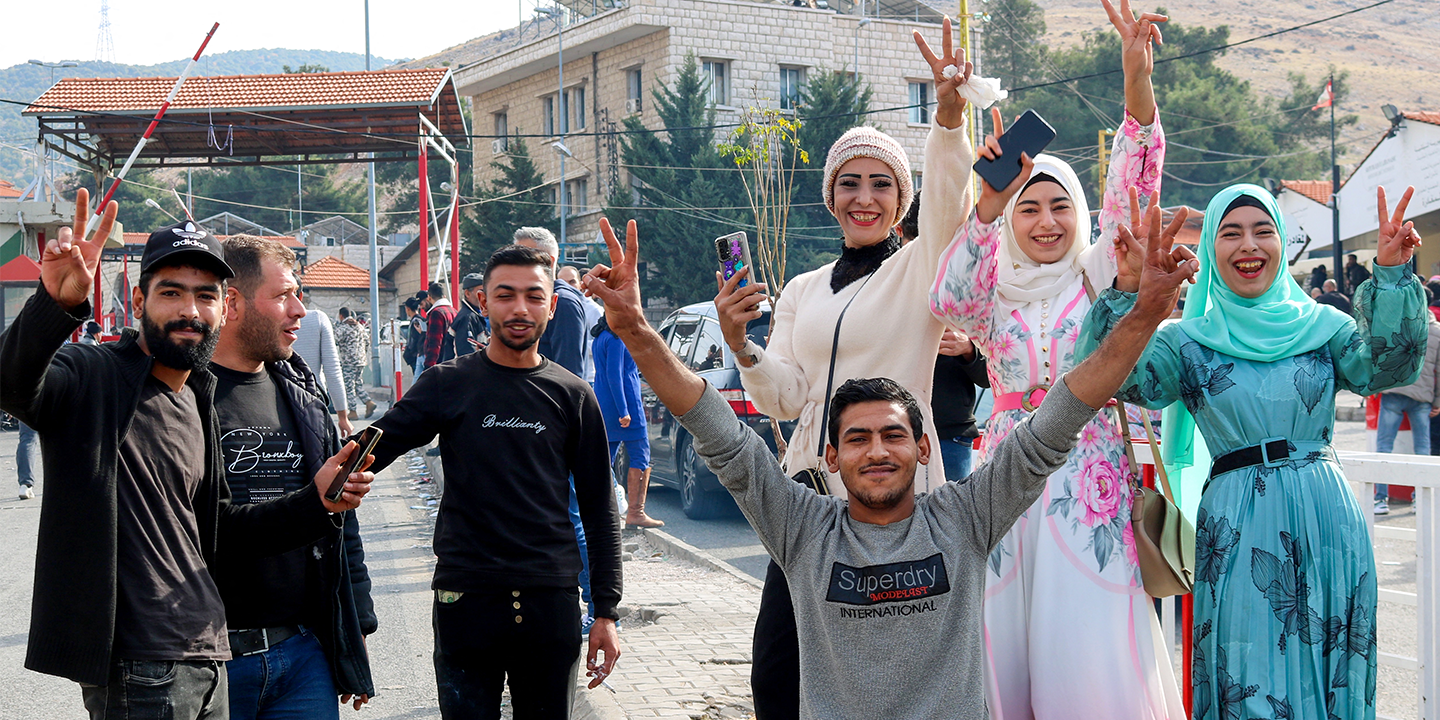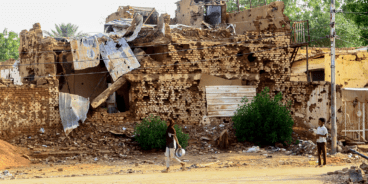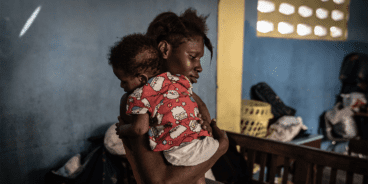

Atrocity Alert No. 421: Syria, Haiti and Genocide Remembrance and Prevention
Atrocity Alert is a weekly publication by the Global Centre for the Responsibility to Protect highlighting situations where populations are at risk of, or are enduring, mass atrocity crimes.
SYRIAN PROTECTION NEEDS REMAIN HIGH AMID HISTORIC END OF ASSAD GOVERNMENT
Following over a week of rapid military advances across northwest Syria, on 8 December a coalition of armed opposition forces, led by Hay’at Tahrir Al-Sham (HTS), seized the capital city of Damascus. President Bashar Al-Assad reportedly fled to Moscow, effectively ending his 24-year presidency. While the future governance of Syria remains uncertain, the forces in de facto control named Mohammed al-Bashir as interim prime minister.
Armed opposition forces began advancing toward Damascus on 27 November, seizing control of territory in Hama, Idlib and Aleppo governorates. Government forces subsequently launched counteroffensives, with airstrikes and shelling resulting in civilian casualties. According to the UN Office for the Coordination of Humanitarian Affairs, fighting displaced more than 1 million people between 28 November and 10 December.
HTS and other groups also freed prisoners from the infamous Sednaya Prison and other state-run detention facilities during their advance. Tens of thousands of people have been held in incommunicado detention in prisons and detention centers, with the UN Commission of Inquiry (CoI) on Syria reporting that more than 130,000 people have been arbitrarily detained, abducted or missing since the start of the conflict in 2011. Reflecting upon the prisoner release, Chair of the CoI Paulo Pinheiro remarked that the current environment in Damascus “is a scene that millions of Syrians could not have imagined a few days ago… It is incumbent on those now in charge to ensure that such atrocities are never again repeated.”
As the Syrian people work toward a peaceful political transition, populations still face many protection risks. Over the course of Syria’s nearly 14-year war the opposition had significantly splintered while other new armed groups emerged. Clashes continue in the northeast between the Syrian National Army, opposition groups and the Syrian Democratic Forces. HTS has reportedly committed to refrain from perpetrating reprisals against actual and perceived Assad supporters. While cautioning about the ongoing grave risks, UN Special Envoy on Syria Geir Pedersen acknowledged that so far “the HTS and other armed groups have been sending good messages to the Syrian people” of unity and inclusivity. Pederson also noted they were seeing “reassuring things on the ground” in Aleppo and Hama.
Amid the fluid situation, the international community must encourage the de facto authorities to facilitate access to humanitarian and human rights actors. HTS and others freeing political prisoners should work closely with the International, Impartial and Independent Mechanism for Syria and the CoI to ensure the documentation and preservation of evidence of the Assad government’s crimes. While thousands of Syrian refugees and asylum seekers who fled during the conflict are now attempting to return, the prospects for safe return for all those displaced by the conflict remain uncertain. States must uphold the principle of non-refoulement and respect the rights of asylum seekers to a voluntary, dignified and safe return.
HORRIFIC MASSACRE IN HAITI LEAVES OVER 100 DEAD
Between 6 and 7 December an armed gang brutally murdered over 100 elderly men and women in Haiti’s Cité Soleil neighborhood of Port-au-Prince. While the exact number of people killed remains unclear, UN High Commissioner for Human Rights Volker Türk reported the death toll at 184 people, including 90 men and 37 women. Scores of residents aged over 60 were reportedly rounded up from their homes in the Wharf Jérémie section of Cité Soleil, and subsequently shot or stabbed to death with knives and machetes. Witnesses reported seeing bodies being burned while some individuals trying to save victims were also killed.
The National Human Rights Defence Network said local gang leader, Micanor Altès – also known as Wa Mikanò and Monel Felix – had targeted older people and Voodoo religious leaders to avenge his son’s death after a local Voodoo priest had accused the area’s residents of causing the child’s sickness with witchcraft. According to news sources, gang members have restricted movement in Wharf Jérémie, which the Haitian organization Cooperative for Peace and Development asserted is for the gang “to continue to identify (Voodoo) practitioners and the elderly with the aim of carrying out the silent killing.”
This latest massacre underscores Haitian authorities’ limited capacity to protect communities across Port-au-Prince, who are often confined to their neighborhoods and face indiscriminate violence, rape, torture, kidnappings and forced recruitment. Cité Soleil is a commune that has faced intense and unrelenting gang violence and turf wars for years, with Wharf Jérémie a strategic area in the port under Altès’ control and one of the most impenetrable gang strongholds.
The powerful gang coalition Viv Ansanm – which Altès is a member of – has launched coordinated attacks across the capital since late February, seeking to expand their territory beyond their strongholds. Attempts to overtake territory have resulted in deadly incidents as gangs increasingly target civilians, particularly in the past two months. In October Gran Grif carried out one of the largest assaults in decades, killing 115 civilians and injuring over 350 others in Pont-Sondé, Artibonite. In mid-November violence flared across several neighborhoods of Port-au-Prince, forcing several humanitarian organizations to suspend their life-saving activities. According to the UN, gang-related violence has killed 5,000 people this year and displaced more than 700,000 people, half of whom are children.
The international community, particularly the United States, must impose stricter measures to prevent the illicit supply, sale, diversion or transfer of small arms, light weapons and ammunitions into Haiti, which fuel violence and provide the means for perpetrating abuses. Stakeholders need to take urgent, concerted action to ensure the Haitian National Police and UN-authorized Multinational Security Support Mission have the sufficient means to quell gang violence and bolster protection for vulnerable communities.
COMMEMORATING THE VICTIMS OF GENOCIDE
On 9 December the international community marked the International Day of Commemoration and Dignity of the Victims of Genocide and of the Prevention of this Crime, as well as the 76th anniversary of the adoption of the Convention on the Prevention and Punishment of the Crime of Genocide. The following day also marked the 76th anniversary of the Universal Declaration of Human Rights (UDHR).
Both the Genocide Convention and UDHR emerged in response to the horrors of World War II, particularly the Holocaust, and marked a historic commitment to prioritize human dignity over power politics. The Genocide Convention went beyond condemnation, establishing a legal and moral duty for states to prevent and punish genocide, while the UDHR laid the foundation for universal human rights protections. This year also holds particular significance as we approach the 20th anniversary of the Responsibility to Protect (R2P) in 2025. R2P reaffirmed the international community’s commitment to protect populations from genocide, war crimes, ethnic cleansing and crimes against humanity.
Yet since the adoption of these landmark documents and the R2P principle, the state of multilateralism has shifted, leaving many of their aspirations and obligations unfulfilled. The international community has often failed to uphold universal human rights and prevent mass atrocities – from Cambodia, Rwanda and Srebrenica to Syria, Myanmar, China, Sudan and Israel and the Occupied Palestinian Territory – countless populations have suffered grave injustices and unconscionable crimes. Nearly a year since the International Court of Justice issued provisional measures in South Africa’s case against Israel, affirming that all states have an obligation under the Genocide Convention to prevent acts that may lead to genocide, the world has yet to take meaningful action to prevent further atrocities against Palestinians in Gaza and the West Bank.
Savita Pawnday, Executive Director of the Global Centre for the Responsibility to Protect, said, “History shows that failure to act in the face of atrocities allows the unimaginable to become reality. We are at a critical threshold, witnessing a deliberate undermining of the collective commitment to fulfill the promise of ‘never again.’ If these commemorations are meant to honor the victims of past atrocities, we have an obligation to respect their memory by taking appropriate action when confronted by risks today.”
As the international community commemorates these anniversaries, UN member states must reaffirm their commitment to the foundational rights, protections and obligations enshrined in these historic documents and recentralize human rights and the rule of law as guiding principles for global governance. Achieving this requires urgent efforts to strengthen multilateral institutions, integrate atrocity prevention strategies into human rights mechanisms and respond decisively to early warning signs. States should also recognize the indispensable role of civil society and victim and survivor communities, whose advocacy and resilience have been critical in upholding the principles of the Genocide Convention and the UDHR. Governments must actively engage with these actors, amplify their voices and ensure their contributions inform policies and actions aimed at preventing atrocities.
Related Content


Atrocity Alert No. 432: Sudan, Venezuela and Haiti
